
Bellis is a genus of flowering plants in the family Asteraceae.

Asphodelus ramosus, the branched asphodel, is a perennial herbaceous plant in the order Asparagales. Similar in appearance to Asphodelus albus and particularly Asphodelus cerasiferus and Asphodelus aestivus, it may be distinguished by its highly branched stem and smaller fruits. There has been a lot of confusion over the nomenclature and taxonomy of the species, owing to its similarity to Asphodelus aestivus.

Pallenis is a small genus of flowering plants in the tribe Inuleae within the family Asteraceae. The name is derived from palea (chaff), referring to the chaffy receptacle.

Atractylis is a genus of plants in the family Asteraceae.

Glebionis coronaria, formerly called Chrysanthemum coronarium, is a species of flowering plant in the daisy family. It is native to the Mediterranean region. It is cultivated and naturalized in East Asia and in scattered locations in North America.

Catananche is a genus of flowering plants in the family Asteraceae. It is native to dry meadows in the Mediterranean region.

Ptilostemon is a genus of plants in the tribe Cardueae within the family Asteraceae.
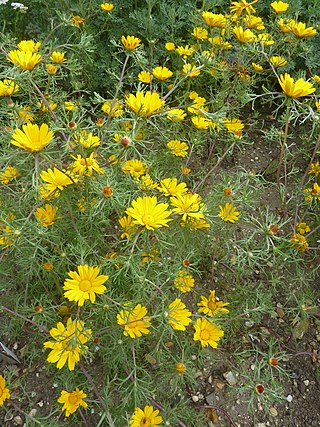
Cladanthus is a genus of plants in the sunflower family, native to the Mediterranean region.

Pancratium maritimum, or sea daffodil, is a species of bulbous plant native to the Canary Islands and both sides of the Mediterranean region and Black Sea from Portugal, Morocco and the Balearic Islands east to Turkey, Syria, Israel and the Caucasus. In the parts of its range on the south Bulgarian and north Turkish and Georgian coasts of Black Sea. It is also naturalized in southern California, Bermuda and the Azores.
The World Geographical Scheme for Recording Plant Distributions (WGSRPD) is a biogeographical system developed by the international Biodiversity Information Standards (TDWG) organization, formerly the International Working Group on Taxonomic Databases. The WGSRPD standards, like other standards for data fields in botanical databases, were developed to promote "the wider and more effective dissemination of information about the world's heritage of biological organisms for the benefit of the world at large". The system provides clear definitions and codes for recording plant distributions at four scales or levels, from "botanical continents" down to parts of large countries. Current users of the system include the International Union for Conservation of Nature (IUCN), the Germplasm Resources Information Network (GRIN), and the World Checklist of Selected Plant Families (WCSP).

The Cardueae are a tribe of flowering plants in the daisy family (Asteraceae) and the subfamily Carduoideae. Most of them are commonly known as thistles; four of the best known genera are Carduus, Cynara, Cirsium, and Onopordum.
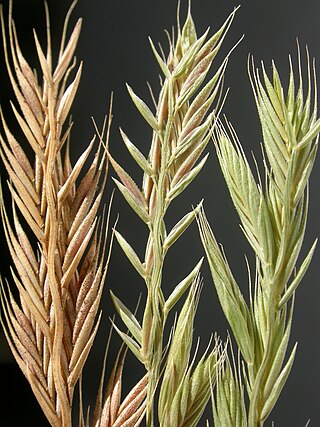
Vulpia is a widespread genus of plants in the grass family, native to many countries around the world and naturalized in many of the nations to which it is not native. It is most common in temperate regions.

Crupina is a small genus of plants in the tribe Cardueae within the family Asteraceae.
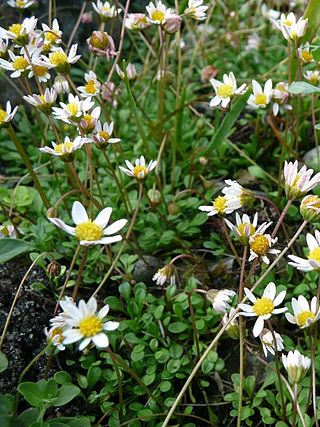
Bellium is a genus of flowering plants in the daisy family, Asteraceae, native to the Mediterranean region.

Echinaria is a genus of Eurasian and North African plants in the grass family. The only known species is Echinaria capitata, native to the Mediterranean Region as well as the Southwest and Central Asia.

Tyrimnus is a genus of Mediterranean plants in the tribe Cardueae within the family Asteraceae.
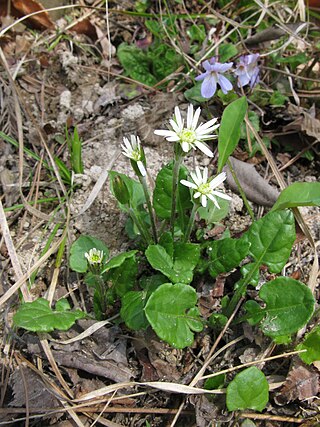
Leibnitzia (sunbonnets) is a genus of Asian and North American flowering plants in the family Asteraceae.

Notobasis syriaca, the Syrian thistle, is a species of flowering plant in the tribe Cardueae within the family Asteraceae. It is native to the Mediterranean region and the Middle East, from Madeira, the Canary Islands, Morocco and Portugal east to Egypt, Iran and Azerbaijan.

Cynomorium is a genus of parasitic perennial flowering plants in the family Cynomoriaceae. The genus consists of only one species, Cynomorium coccineum. Its placement in the Saxifragales was resolved in 2016 with the help of nuclear, plastid, and mitochondrial sequences obtained from next-generation sequencing. Common names include the misleading Maltese fungus or Maltese mushroom; also desert thumb, red thumb, tarthuth (Bedouin) and suoyang (Chinese). A rare or local species, it grows in dry, rocky or sandy soils, often in salt marshes or other saline habitats close to the coast. It has had a wide variety of uses in European, Arabian and Chinese herbal medicine.
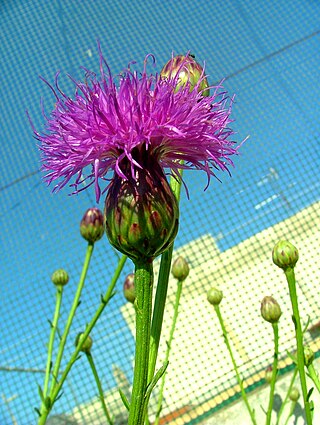
Cheirolophus is a genus of flowering plants in the family Asteraceae first described as a genus in 1827.



















